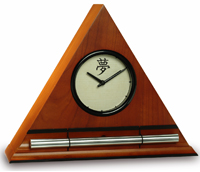
Choose a Gentle Chime Alarm Clock - Eisen Keisai, Woman Getting out of a Mosquito Net
When his clock-radio goes off at 7 a.m., David Epstein’s latest wake- up strategy roars into high gear: He stumbles out of bed, walks across the room and pushes the snooze button. Then he climbs back between the sheets.
A few minutes later, his travel clock rings. He presses snooze and rolls over for more sleep — until the alarm on his BlackBerry goes off. Sitting up, he punches keys to reset it for 10 more minutes; then it’s back to the pillow.
The pattern repeats amid a cacophony of assorted rings until his real wake-up time, 8 a.m.
In a nation that clocks around six to seven hours of sleep a night when an average of eight hours is recommended, it is a rare person who wakes up without an alarm. And because it is usually a struggle, pushing “snooze” to delay the day has become as much a part of the wake-up ritual as a cup of coffee.
But is a bumpy arousal for 30, 60 or even 90 minutes a way to recoup much- needed sleep? Or is it a recipe for exhaustion?
Although scientists have not specifically tackled the question, sleep researchers agree that short bouts of sleep are far from ideal. The restorative value of rest is diminished, especially when the increments are short, said Dr. Edward Stepanski, who has studied sleep fragmentation at the Rush University Medical Center in Chicago. And a teeter-totter effect of dozing and waking causes shifts in the brain-wave patterns.
“Even a subtle noise that doesn’t actually wake you up is disruptive enough to affect the sleep quality,” Stepanski said. “That’s why someone who falls asleep with the TV on may wake up exhausted. So, if a person is rousing themselves enough to reset a clock, there’s likely to be an even more profound effect.”

Banish the Snooze Button -- Choose a Gentle Chime Alarm Clock
It is an axiom of sleep research that not all sleep is equal. A night’s sleep is divided into five continually shifting stages, defined by types of brain waves that reflect either lighter or deeper sleep. Toward morning, there is an increase in rapid eye movement, or REM sleep, when the muscles are relaxed and dreaming occurs, and recent memories may be consolidated in the brain. Sleep-deprived snooze-button addicts are likely to cut short their quota of REM sleep, impairing their mental functioning during the day.
How tired a person is when the snooze-button frenzy begins is important, experts say. Someone who got a full eight hours of sleep may push the snooze button, but won’t nod off again very easily, Stepanski said. And some people seem to be more tolerant of short-term sleep loss.
But the person who has been getting too little sleep for too long may be a wreck, especially by Friday after racking up a large sleep debt during the week.
To complicate matters, feeling alert is not just a matter of getting the right dose of different kinds of sleep. The body has its own alarm clock, a circadian rhythm in which fluctuations in hormones like cortisol, melatonin, ghrelin and growth hormone regulate sleepiness and alertness, as well as other body functions.
And sleep patterns can run on a schedule different from a person’s body clock. Trying to sneak in more sleep when someone is used to getting up early can cause the body to switch to an alert mode, making any extra sleep light and fragmented, said Dr. Timothy Roehrs, the director of research at the Sleep Disorders and Research Center at Henry Ford Hospital in Detroit.
On the other hand, if someone’s body is on a later cycle from habitually staying up late, waking up early is that much harder because the body is not yet pumping out peak levels of cortisol and other hormones that help wake people up.
Still, most hard-working people cope, managing to live in what researchers agree is a perpetual sleep-deprived state.
They mask fatigue by keeping themselves alert with a variety of stimuli, like caffeine, exercise or simply keeping busy. Some people with sleep debts do not consider themselves tired, believing that they are functioning normally, said Dr. David Dinges, chief of the sleep and chronobiology division at the University of Pennsylvania School of Medicine.
But evidence is mounting on the behavioral risks of long-term partial sleep deprivation. Not getting enough sleep day after day takes its toll. And it is not only medical interns and truck drivers doing double shifts who can suffer from serious mistakes at work because of it.
In the August issue of the journal Sleep, Roehrs published one of the first studies to measure the effect of sleepiness on decision making and risk taking.
Roehrs and his colleagues paid sleepy and fully alert subjects to complete a series of computer tasks. At random times, they were given a choice to take their money and stop. Or they could forge ahead with the potential of either earning more money or losing it all if their work was not completed within an unknown remainder of time.
“The alert people were very sensitive to the amount of work necessary to finish and the risk of losing their money if they didn’t,” Roehrs said. “The more work they had, the more apt they were to stop. Without fail, the sleepy people chose to quit when it was optimal to continue, and they gambled losing it all by trying to finish the task for more money even when it was 100 percent likely that they would be unable to finish.”
Numerous studies have documented sleep impairments on memory, reaction time, comprehension and attention. Even emotional states can be affected. One of the first signs of sleep debt is irritability and increased depression, said Dr. Arthur Spielman, a professor of psychology and sleep researcher at City College of New York.
So what is a sleepy person to do? Start paying back sleep debt, for starters, experts say. Turn off David Letterman and get to bed half an hour earlier. Night owls who do not feel sleepy should cut off the stimulation: turn off the lights and television and lie in bed with closed eyes for one minute to unmask their sleepiness, Spielman recommended.
He added that those who still found it hard to get to sleep early at night should wake up early and experience morning light to reset the body clock.
After a couple of weeks, they will feel more tired in the evening and go to sleep earlier, making it easier to get up the next day, he added.
And come morning, setting the clock for only 10 minutes earlier than the optimal wake-up time, allowing for only a single opportunity to press the snooze button, will provide the most restorative period of solid sleep.
Of course, waking at the last possible minute requires a leap of faith.
“I’m not convinced that this would work, because I don’t trust myself to get up,” Epstein admitted. “Besides, I like to ease myself out of bed. When that alarm rings, I would sell my soul for an extra 15 minutes of sleep.
“So, by setting my clocks an hour earlier, I get to wake up and know that I can go back to bed. It feels really good.”
Have no fear – there is an Alternative to the Snooze Button — Choose the built-in Snooze – a Gradual, Soothing Chime Alarm Clock
Now & Zen ® creates natural lifestyle products that make a real difference in people’s lives. The growing preference for natural foods and natural fibers is carried forward by Now & Zen® in the natural acoustic sounds and natural hardwood materials featured in every Now & Zen® product. With a selection of different styles, these unique alarm clocks wake you gradually and naturally. A series of acoustic bell-like chimes transforms your daily arrival into a tranquil beginning. Each timepiece combines beauty and versatility. These are high quality products that are not only modern and luxurious but are also peaceful and add to a stress-free day in an already stress filled world.
adapted from SFgate.com, by Martica Heaner, New York Times

Gradual Chime Alarm Clock with Soothing Sounds
Now & Zen – The Zen Alarm Clock Store
1638 Pearl Street
Boulder, CO 80302
(800) 779-6383
Posted in Uncategorized